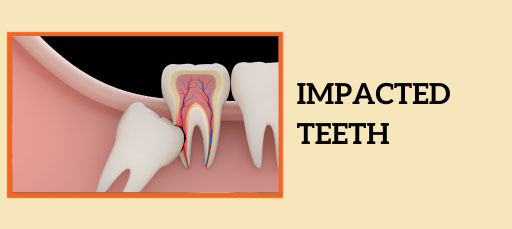
Wisdom Tooth Impaction – Symptoms, Causes, Treatment
Table of Contents
Wisdom teeth, known as third molars, usually emerge between 17 and 25. However, they often cause issues due to impaction, a common dental problem. Understanding the symptoms, causes, and available wisdom tooth impaction treatments is crucial for effectively managing this condition. We need to know what it is before we learn about the symptoms and treatment for wisdom tooth impaction.
What is Impaction?
Impaction is when a tooth fails to emerge fully through the gums and remains partially or entirely trapped within the jawbone. It commonly occurs with wisdom teeth (third molars) due to limited space in the mouth. Wisdom teeth Impaction can cause pain, swelling, infection, and potential damage to surrounding teeth.
Types of impacted wisdom teeth
Impacted wisdom teeth are third molars that don’t have enough space to emerge or develop normally in the mouth. There are several types of impacted wisdom teeth based on their orientation and position relative to the surrounding structures
- Mesial Impaction: The most common type, where the tooth is angled toward the front of the mouth.
- Vertical Impaction: The tooth is angled typically but doesn’t have enough room to erupt fully.
- Distal Impaction: The tooth is angled toward the back of the mouth.
- Horizontal Impaction: The tooth is positioned horizontally, parallel to the jawbone.
- Soft Tissue Impaction: The tooth has partially emerged from the gum but is covered by gum tissue, making cleaning difficult.
- Bony Impaction: The tooth is completely encased in the jawbone, requiring surgical extraction.
Symptoms of Wisdom Tooth Impaction
- Pain and Discomfort: Impacted wisdom teeth can cause persistent pain or discomfort, especially while chewing or biting down.
- Swelling and Redness: Inflammation and redness around the gum area where the impacted tooth lies.
- Jaw Stiffness: Difficulty opening the mouth fully due to the pressure from impacted teeth.
- Bad Breath or Unpleasant Taste: Accumulating bacteria around the impacted tooth can lead to bad breath or an unpleasant taste in the mouth.
- Headaches: Some individuals may experience headaches or earaches due to the pressure from impacted wisdom teeth.
Causes of Wisdom Tooth Impaction
- Lack of Space: The jaw may not have enough room for the wisdom teeth to emerge properly, leading to impaction.
- Angled Growth: Wisdom teeth might grow at an angle, causing them to collide with neighboring teeth, resulting in impaction.
- Late Eruption: Wisdom teeth that emerge late might not have sufficient space, leading to impaction.
- Soft Tissue Obstruction: Sometimes, a flap of gum tissue may cover a partially erupted wisdom tooth, causing impaction.
Wisdom Tooth Impaction Treatment
- Extraction: The most common treatment for impacted wisdom teeth involves surgical extraction. Dentists or oral surgeons perform this procedure under local or general anesthesia.
- Antibiotics and Pain Management: If there’s an infection due to impaction, antibiotics may be prescribed. Pain management options like over-the-counter or prescription pain relievers can help manage discomfort.
- Surgical Procedures: In certain complex cases, Advanced Gum Treatments like surgical interventions such as cutting through the gum tissue or removing bone might be necessary to extract the impacted tooth.
Prevention
Regular dental check-ups and X-rays can help monitor the development and position of wisdom teeth. Early detection of potential impaction can lead to timely intervention and prevent complications.
When to see a doctor?
If you suspect you have impacted wisdom teeth or are experiencing any symptoms associated with them, it’s advisable to see a dentist or oral surgeon for an evaluation. Here are some signs and symptoms that may indicate you should seek medical attention for impacted teeth:
- Persistent pain or discomfort in the back of the mouth, jaw, or surrounding areas.
- Swelling, inflammation, or tenderness in the gum tissue around the impacted tooth.
- Difficulty Opening Mouth: Difficulty opening your mouth fully or experiencing stiffness in the jaw.
- Persistent bad breath or an unpleasant taste in the mouth.
- Difficulty chewing food properly, especially in the back of the mouth.
- Visible signs of a partially erupted tooth, such as swelling or redness around the gum line.
- Changes in the alignment of your teeth, especially if you notice crowding or shifting in the back of the mouth.
Conclusion
Wisdom tooth impaction can be a painful and bothersome dental issue. Still, with proper diagnosis and timely treatment, the discomfort can be alleviated. Consulting a dentist for regular check-ups and discussing any symptoms of impaction can aid in early detection and appropriate management, ensuring optimal oral health. If you have pain and have an impacted tooth, you can get it checked by booking an appointment here.
DISCLAIMER:Please note that the prices mentioned on this page: (a) present a range (depending upon the severity of the dental condition, the technology used in treatment, type of dental products used, etc.); (b) are true as on the date of this page and may change on a later date, in accordance with the standard company policy; (c) may be subject to standard aberrations or generalizations on account of the use of AI in general Google/internet search by you.Leave a Reply
Leave a Reply
Explore More Similar Posts
Explore More Blogs


Leave a Reply